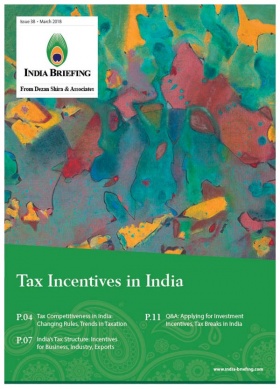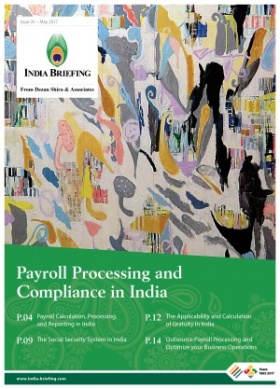GST Compliance for Input Service Distributors, TDS, TCS in India
Last year saw an overhaul of the indirect tax system in India with the implementation of the Goods and Services Tax (GST).
Here we discuss the GST returns compliance for input service distributors; withholding taxes (TDS) for purchasers of goods and services; and Tax Collection at Source (TCS) for e-commerce operators in India.
Input Service Distributor – GSTR 6
An Input Service Distributor is the office that receives the invoice for input services rendered to any or all of their branches registered under the same PAN. The credit for CGST/SGST/IGST paid for these services should be distributed on a proportional basis by amount of input received to the respective branches.
Input credit is a provision under the GST Act that allows a business to claim back the taxes paid for purchase of certain goods and services.
For example, if a supplier is taxed Rs 500 (US$7.76) on the goods purchased, and is taxed Rs 750 (US$11.51) on the sale of the same goods, they will receive input tax credit of only RS 500 (US$7.76), and must pay the balance amount of Rs 250 (US$3.75) as tax.
This provision allows a business that incurs a large share of common expenditure to simplify the input credit procedure and is only applicable if both parties, the purchaser and the supplier, have paid taxes. Therefore, it avoids double tax on a single service or product.
Incorrectly claiming input credit is a criminal offence and attracts fines of up to 24 percent interest on the excess amount of credit claimed annually.
The GSTR 6 is the monthly return to be filed by an Input Service Distributer by the 13th of the next month. This form details the documents issued and the manner for distribution of input tax credit.
The GST Council recently notified an extension for the submission deadline to March 31 2018 for all returns for the period of July 2017 to February 2018.
Tax Deduction at Source – GSTR 7
Tax collected by a purchaser of goods or services at the time of payment to a supplier is known as Tax Deduction at Source or ‘withholding tax’.
Any department or establishments under the federal or state government, local authorities, government agencies, and persons notified by a government body, as well as public sector undertakings that collect TDS are required to file GSTR 7.
The rate of TDS under GST is one percent CGST and one percent SGST, therefore total rate is two percent, and is applicable for contracts valued above Rs 250, 000 (US$3,835).
If the contract involves inter-state purchasing, i.e. the supplier is registered in a different state from the recipient, no TDS is charged.
Non-deduction, short deduction, non-payment, or short payment of TDS is an offence and a minimum penalty of Rs 10,000 (US$154.10) is prescribed under the GST act.
While the registration started late last year, the GST council deferred the filing provisions and processes for TDS to June 30, 2018 to ensure an uncomplicated rollout of the GST system.
The Indian government, on average, grants up to 10,000 civil contracts per year. For contractors to be eligible for input credit, they will have to register under GST and file this form once the council announces its commencement. This will be an important step to ensure tax compliance from the contractors as input credit from government contracts will be reflected in their own GSTR 1, 2, 3, 3B filing.
Tax Collection at Source – GSTR 8
Businesses that own or manage a digital or an electronic facility or platform for e-commerce have to obtain GST registration as well as register for TCS through form GST REG 07.
An e-commerce operator, such as Flipkart, deducts TCS from payments made to them from a purchaser before remitting the same to the supplier.
Form GSTR 8 has to be filed by all eligible operators by the 10th of the following month. This form details the supplies effected through an e-commerce platform and one percent TCS is collected on them.
The TCS through submission of GSTR 8 will reflect on form GSTR 2A of the supplier. Annual returns through GSTR 9B has to be submitted by these taxpayers by December 31 of the next financial year.
As for TDS, the registration for TCS also started late last year, but the filing has been deferred to June 30 2018.
In a clarification of guidelines, the GST council notified that e-commerce operators with sales less than Rs 2 million (US$30,680) need not register and that e-commerce operators cannot opt for the composition scheme.
Penalty for late filing
The maximum amount of late fees is Rs 5,000 (US$76.70). An additional 18 percent annual interest on the tax must also be paid in case of delayed filing.
About Us
India Briefing is published by Asia Briefing, a subsidiary of Dezan Shira & Associates. We produce material for foreign investors throughout Eurasia, including ASEAN, China, Indonesia, Russia, the Silk Road, & Vietnam. For editorial matters please contact us here and for a complimentary subscription to our products, please click here.
Dezan Shira & Associates provide business intelligence, due diligence, legal, tax and advisory services throughout India and the Asian region. We maintain offices in Delhi and Mumbai and throughout China, South-East Asia, India, and Russia. For assistance with India investment issues or into Asia overall, please contact us at india@dezshira.com or visit us at www.dezshira.com.
- Previous Article GST Compliance for Non-Resident Businesspersons, Diplomats, UN Personnel in India
- Next Article GST Returns for Regular Business Entities in India














